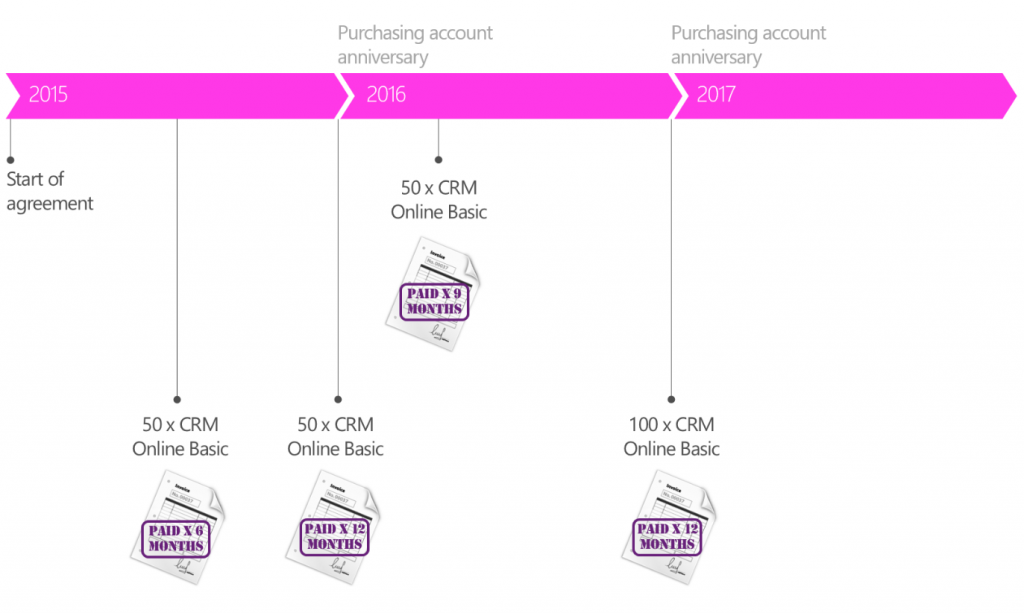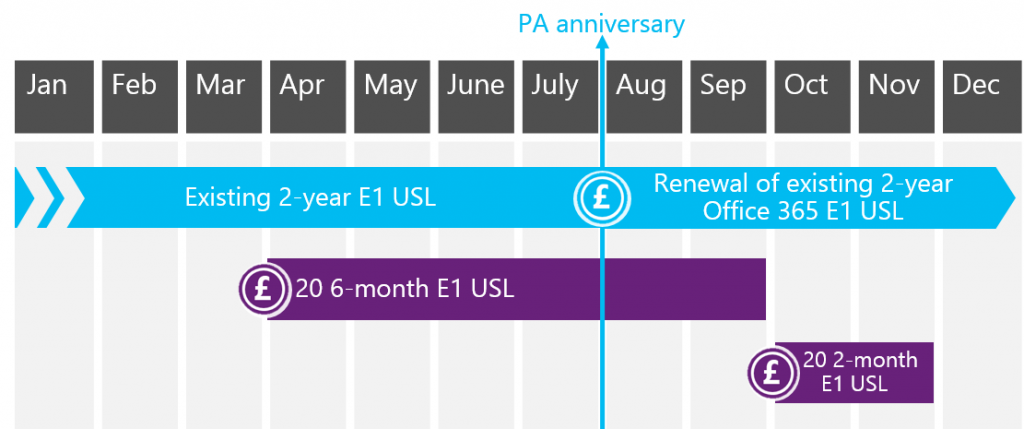Licensing Logic: Short term subscriptions
By David Cattanach, Microsoft Volume Licensing team
You may be familiar with Microsoft cloud services, such as Office 365. These services are licensed on a subscription basis (they cannot be perpetual licences as with traditional, on-premises software) and the subscriptions are typically for twelve month periods.
Many organisations need to make temporary staffing increases to accommodate specific project needs or to support a seasonal business. If you have 400 permanent staff but required 50 additional staff for a 7-month project, you would purchase 450 cloud subscription licences for a year and have 50 of them unused when the project ends. You can’t pause subscription licences so you have no choice but to effectively over-licence 50 users by five months.
Customers now have the option to license a range of cloud services on a short-term basis for less than 12 months. This short-term option is available for customers through an MPSA (Microsoft Products and Services Agreement) which is the evolution of Microsoft’s Volume Licensing (VL) programs. It has been maturing and developing steadily since introduction in late 2013.
Which Subscriptions have the Short-term Option?
- Office 365 E1
- SharePoint Online Plan 1 and Plan 2
- Exchange Online Kiosk Plan 1 and Plan 2
- Office 365 K1 (kiosk)
- Enterprise Mobility Suite (EMS)
- Dynamics CRM Online (and Parature) increased capacity Add-ons; for example you can add 10,000 additional social messages
How Do Short-term Subscriptions Work?
It is possible to get ‘accidental’ short-term subscriptions. Let’s explain that first.
The MPSA has a Purchasing Account (PA) anniversary each year of the agreement. If a customer pays for a subscription licence mid-year, they are charged for the remaining time up to the next Purchasing Account anniversary, see figure 1 for an example.
- Let's say we started the MPSA in 2015, the month doesn't matter.
- In month six the customer provisions 50 seats of CRM Online Basic and an invoice is issued for payment up to the next Purchasing Account anniversary which is for 6 full months.
- At the Purchasing Account anniversary, if the customer wants to continue with the CRM Online Basic subscription, an invoice is issued for the full 12 months.
- Three months into the second year, the customer needs another 50 CRM Online Basic user licenses so pays up front for 9 months of service.
- At anniversary, if the customer wishes to continue then they pay for 100 CRM Online Basic seats for 12 months.
In reality it is unlikely to be possible for a business to engineer their PA anniversary to coincide with their projects so short-term subscriptions don’t have to.
Figure 2 shows a company which needs to hire 20 contractors to work on a design project.
- The company already has a number of existing Office 365 E1 User Subscription Licences (USL) for 2 years which are aligned to the PA anniversary in August.
- The design project is due to run between April and September. Because the project doesn’t align with the PA anniversary, short-term subscriptions are ideal. At the time of purchase, the customer will pay upfront for the six-month subscriptions.
- The company decides to extend the short-term staff for another two months, however there is no renewal option for short-term subscriptions so they will make another, separate order of Office E1 USLs for two months. As there’s no price-protection on short-term subscriptions, the customer will pay the current price from the October price list. The same users can be activated again though (as long as it’s within 90 days) so there would be no loss of user data.
Summary
Short-term subscriptions are easy. They have the same SKU as 1, 2 and 3 year subscriptions (just labelled as ‘Short-term’ in the price) and the term is entered by your licensing partner through the ordering tool.
Short-term subscriptions align to the end of the last calendar month as opposed to the PA anniversary.
There are no renewals for short-term subscriptions and price protection doesn’t apply.
Short-term subscriptions are available for commercial, academic and government customers from March 2016.
Expect More Enhancements to MPSA in the Future
Since launch, the MPSA has been hugely successful. Whilst the Enterprise Agreement remains the most appropriate VL program for customers who are able to make an enterprise-wide commitment, the MPSA is perfect for transactional purchasing of on-premises and online licences. Select Plus has now been retired and since July 1st no new commercial Select Plus agreements can be signed and from the first anniversary of existing commercial customer Select Plus agreements that occurs after July 1st 2016, no new orders will be taken on these Select Plus agreements.
MPSA will continue to mature and evolve and we will continue to add features and new offers to this platform. We’ll continue to keep you up to date with blog posts and readiness events.

